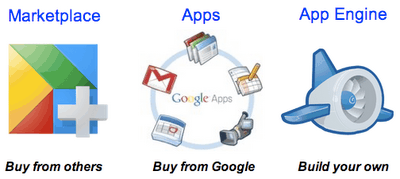| Google I/O |
| Written by Ian Elliot | |||
| Tuesday, 25 May 2010 | |||
|
The Google developers conference is a place where you might expect to hear about exciting new things. Was it a big deal or was it all marketing and incremental progress?
Given that Google I/O is billed as "Google's developers conference" not a lot seems to have happened to shake the developer's world. There was a great deal of fuss about the the launch of Android 2.2 (Froyo) and the annoucment of Google TV which is planned to run Android and Chrome. The new Android is a step in the right direction. It is faster thanks to a JIT compiler that augments the VM and there are a host of minor improvements - auto app updates, SD card support, portable hotspot support and Flash support. All worth having but incremental rather than revolutionary. Possibly more interesting is the news that C# development might be coming to Android. Novell has added MonoDroid to the Mono project and this allows C# programs to talk to the native Java API. It still isn't clear if a similar tool will be allowed to run on the most protected of all platforms, the iPhone/iPad. Google TV may be an interesting development and you certainly need to keep any eye on it, but at the moment there isn't much you can do about it unless you are a "big player". There are plans to open up the platform more generally, but not until 2011. At the moment all we can do is optimise our web sites so that they work with the new devices. An interesting development that has mostly been over-shadowed by reports of Google TV is the Google App Engine for Business. In case you have missed the story, Google Apps has been trying to encourage developers to produce products for it by launching the Apps market place and making the Google App Engine API easier to use. Now we have the Google App Engine for Business which allows users to deploy internal apps on the Google cloud infrastructure. A collaboration with VMware will also make it easier to move applications from on-site to in-cloud with out making any changes.
If you have or plan to create any Chrome browser applications then the new Chrome Web Store will make it easier to get to users. Although it has Chrome in the title the apps can be any old web applications - which is a little odd and suggests that the store should be called "any browser" store. Of course you can take advantage of the unique features of Chrome. For example you could use the Native Client SDK which allows a browser to run C/C++ code. The store is live but there are no apps listed at the moment. Among the announcements was the final release of Google Wave to everyone. You now just register and join the rest of the users trying to work out what to do with this new application. It is also now available on Google Apps. Google Storage for Developers is well ... cloud storage aimed at developers. The only question this raises is what storage requirements developers have that make them in need of a targeted facility? Google Storage uses a REST interface, can work with very large, hundreds of Gigabyte, objects and is replicated across data centers. Intended for use with web applications access is controlled by key or email authentication. Currently the service is available as a preview and you can have 100GB and 300GB of traffic per month for free. Of course the big announcement that has made it into the more general news is that Google has open-sourced the VP8 codec which it recently acquired as part of a take over. In addition the WebM project has been established with the aim of developing the WebM video format which VP8 supports. Both initiatives should help with the HTML5 video problem - i.e. whether to use a patented codec or an open source one. VP8 is open source and claims to be high enough quality to do the job. Mozilla and Opera have been involved in the development of WebM and Microsoft partially supports it in IE9 in that if the codec is installed it will use it. There are also a number of new APIs. An API for downloading fonts may sound tedious but it's very useful. You can now set your web page to download a font from Google and use it independent of the browser. Good but at the moment there are only 18 fonts in the library. An API for Google Buzz give us yet another social bookmarking service that we have to integrate with and in the process do more for Buzz that it does for us.
So Google I/O produced very little new or radical from a programmer's point of view - we will have to wait to see if Google TV provides anything to work with.
|
|||
| Last Updated ( Monday, 24 May 2010 ) |



